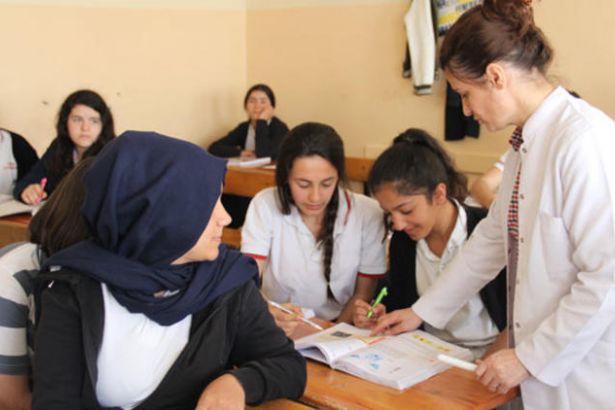7 in 10 teachers in Turkey consider quitting their jobs

Education and Science Workers’ Union of Turkey (Eğitim-Sen) released a report on a survey conducted with teachers about the perception of being a teacher and the status of teachers in Turkey in regard to November 24 which has been celebrated as the Teachers Day in Turkey since 1981.
As part of a campaign they started on October 5, international Teachers Day, Eğitim-Sen carried out the survey with 2424 teachers and shared several results. The results show that, of teachers,
- 57% think that the salary does not correspond to the workload,
- 96% think that the provisions of the Collective Contract of 2018 must be updated immediately,
- 70% think that they can leave their jobs if they received a job offer with better economic conditions,
- 59% do not feel valued at work,
- 76% does not agree with the claim that teachers have been effective in the formation of educational policies with the campaign the Turkish Education Ministry (MEB) carried out within the context of the project named “1 Million Teachers, 1 Million Ideas”,
- 84% do not think that the “2023: Document of Vision in Education” will provide permanent solutions to their problems,
- 94% think that working in separation as “paid/staffed/contracted” threatens the future of their profession,
- 79% think that the Teaching Profession Code, which was announced by the MEB to be in preparation, will not provide solutions to the fundamental problems of teaching.
Emphasising that the only thing promised to teachers is to loyally obey the political power and work as a functionary of the government, Eğitim-Sen said: “We want to feel safe and valued. We want the distinctions such as paid, staffed, and contracted to be abolished and to be employed in surety, we want humane living and working conditions. We want the unassigned teachers to meet with their students. In short, we want to be the teachers of the people, not the government, and do our job freely.”
Education and Science Servers’ Union (Eğitim-İş), on the other hand, conducted a study on teachers’ economic, professional, and social conditions. The research, carried out with 1060 teachers in 23 cities of Turkey, revealed that teachers are in poor conditions from the three aspects.
While teachers state that the quality of education has drastically dropped in state schools, only 45,76% of the teachers believe that the current Minister of Education can solve the problems in education. 70% of the teachers are worried about the interference of Directorate of Religious Affairs and various associations and foundations into education.
77,83% of the teachers who participated in the research note that teaching has lost its virtue of being a reputable profession, while 64,72% say that their motivation has diminished due to their debts. 4 in 10 teachers also state that they could quit their jobs provided that they found a better-paying job.
The study also shows that 42,17% of the teachers use more than two credit cards, but 29,25% can pay only the minimum debt. Nearly 33% have debts to persons, and 22,36% have a second job. 87,73% of the teachers say that they are paid less than their peers in other countries, and 43,96% state that they cannot afford their children’s educational needs.
As in every area of life they have ever regulated, Turkey’s ruling AKP party regulates education according to the needs of the capital. One of the most distinct indications of this is the fact that there are nearly 10,000 private schools in Turkey.
Turkish Education Minister Yusuf Ziya Selçuk, also shareholder of a corporate private schools chain himself, had announced in September this year that the state schools needed 117,000 teachers, but they had assigned only 20,000, while unassigned teachers are forced to work in various jobs from supermarkets to gas stations and hotels, getting killed in occupational murders in construction sites, mines, and plantations, and committing suicide because they cannot pay their bills and debts.
Even after being assigned, teachers do not have their jobs secured. Having started the practice of “contracted teaching” several years ago, the AKP has been forcing teachers to take shady exams and interviews only for the possibility of an assignment to schools where they would have to work under contract for 4 years, and after being re-evaluated and staffed by the ministry, continue to work for another 2 years without any requests of reassignment. Even after they pass the exams and interviews and have the right to be assigned, many teachers are not allowed to start working for months with the alibi of a security clearance. Being a contracted teacher also means that getting paid less and facing the threat that the annual contract may not be renewed.



